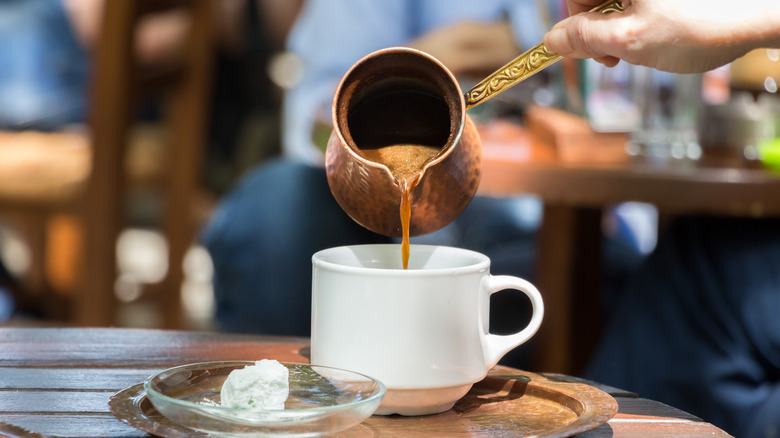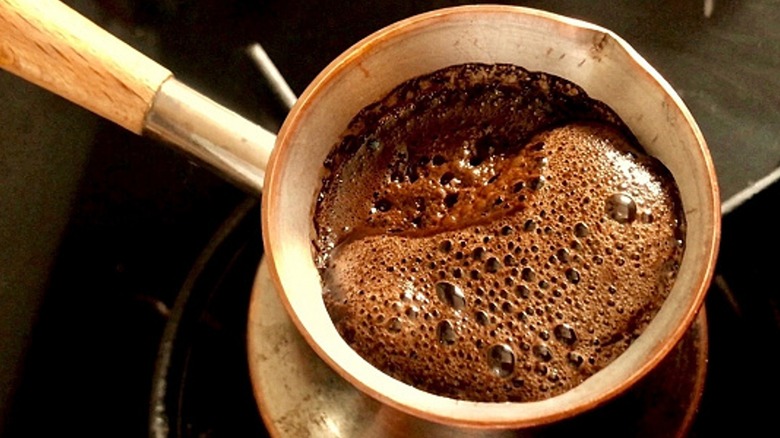What Is Greek Coffee (And What Makes It Special)?
Coffee may be one of the most universally recognized and enjoyed beverages after water. Regardless of where you are on the map, you'll likely find a version of freshly brewed coffee beans available to enjoy. On the islands of Greece, for example, locals and tourists alike enjoy coffee pretty much anywhere at any time of day. A survey conducted by Kapa Research found that 84% of Greek residents enjoy at least one cup of coffee daily, and a large majority of those surveyed claimed to have two or three cups daily. Clearly, coffee is essential in Greek culture, but you won't find locals drinking just any type. Coffee drinkers in Greece swear that Greek coffee is the secret to a long life.
While Greek coffee is brewed and sipped like any other coffee, the difference derives from its signature style of brewing, its finely ground beans, and its extra-strong flavor and texture. People who have tried Greek coffee often claim that the region's brew is stronger and richer than other styles of coffee. It is often served black with the option to add milk or sugar if needed — although adding a large amount of sweeteners could be a dead giveaway that you are a tourist.
You can't make Greek coffee with just any pot
Greek coffee is not just a beverage; it's a tradition. It's typically made from Arabica coffee beans that are ground into a fine powder before brewing or, more technically speaking, boiling. This powder and water are inserted into a briki, a small, open-top pot usually made of brass or copper. The coffee mixture is boiled inside the briki and served in a small cup similar to a cup of espresso. This unique brewing process gives Greek coffee a distinct texture and strong flavor. Unlike other brewing methods that isolate the coffee grounds from the final liquid beverage, you'll likely find coffee grounds in Greek coffee still floating around in your cup before they settle to the bottom.
This unique style of coffee has ancient origins. While coffee was originally invented in ancient Arabia, some claim that trade networks brought the beverage to Greece during the Ottoman Empire in 1475. However, the exact origins are contested, given that Greece's Turkish neighbors have a similar coffee style. For a while, there was no significant cultural distinction between Greek and Turkish coffee, but when Turkey invaded Cyprus in 1974, Greek coffee drinkers made sure to differentiate their culture's unique brew.
Brewing and enjoying coffee is a major part of Greek culture
Coffee culture varies greatly around the world — in the United States, coffee is mostly reserved for adults who drink it as a way to wake up early and get through the workday with a boost of caffeine. But in many parts of Europe, including Greece, coffee is seen more as a beverage for sipping and enjoying rather than consuming for function. Hosts in Greece will offer their visiting guests a cup of coffee at any time of day, and they may order another coffee at a cafe to accompany various pastries and sweets. It is also not uncommon to see young children indulging in a coffee break alongside their older family members. One Reddit user from Greece shared that their parents allowed them to drink coffee at around 5 years old. They also shared that grabbing a coffee is a popular activity amongst teens, although they recalled that not all establishments are willing to serve it to minors.
While it is common in some cultures to drink coffee rather quickly in order to feel its caffeinated benefits, Greeks may take up to two hours to enjoy one espresso-sized cup. The trick that locals follow is to let the freshly brewed coffee sit for a while to let the grounds fall to the bottom of the cup, then slowly sip and savor your beverage.


